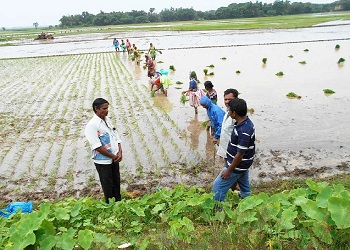NRM & LIVELIHOOD PROGRAMMES

Strengthening & Empowering Pani Panchayats:
The Indian economy is largely agrarian and about three fourths of the entire population depends upon agriculture and related activities directly or indirectly. The case of Odisha is no different. But unfortunately most of the agricultural operations in the state depend entirely upon monsoon as less than one-third of the total arable land. So the farmers in the state are highly vulnerable to erratic and scanty rainfall. Over the past few years the govt of Odisha has been trying to promote irrigation through various models to enhance livelihood in the state For promotion of agricultural productivity through over ground irrigation, Dept. of Water Resources, Govt. of Odisha is implementing “Orissa Integrated Irrigated Agriculture and Water Management Investment Programme (OIIAWMIP)” which primarily aims to enhance the agricultural and incomes by realizing the full development potential of irrigation infrastructure and CAD work, setting up sustainable management systems for irrigation schemes, improving the livelihood of the poor and putting into operation effective processes and mechanisms based on a sound policy and institutional framework where Pani Panchayats (PPs) are developed as cohesive platforms to establish linkages with input delivery, technical support, product marketing and post harvest activities in six major and minor irrigation system in the state. IRDMS is privileged to be part of this programme for strengthening the PPs so that the farmers are able to access to equitable water distribution for irrigation purpose.
LIVELIHOOD ENHANCEMENT
There are numbers of vulnerable families with extremely low income which force them to live in acute poverty or migrate out of their areas in search of work. So the organization had identified the vulnerable groups, especially the women/widow headed families without any support, distressed families, landless families, Physically handicapped persons, Poor SC, ST families etc. During the micro-plan preparation process the lists of vulnerable families were prepared which later validated through village level meetings. Then after JFPR initiated its livelihood activities in some villages of our operational PPs with the same beneficiaries identified by us during Micro Plan preparation process. The SST also supports the JFPR personnels in validation and formation of Common Interest Groups (CIG) for undertaking various income generating activities as per their need and technical capability. Then during this project period we had also formed 36 nos of CIGs in different villages of our operational PPs where CIG not working. We had only formed CIGs but not able to initiate any income generating livelihood activities as no fund available with us or with the PP for the purpose.
